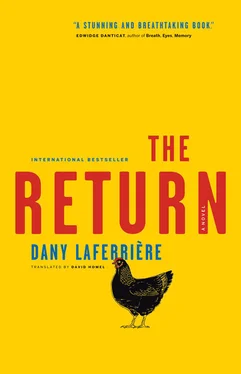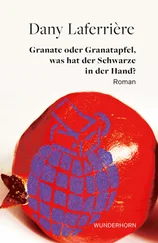I continue my walk
trying to remember
the dictator’s poem I had to
learn by heart at school.
“And the black of my ebony skin was lost
in the shadows of the night.
When, that night, as hideous as a madman,
I left behind my cold student room.”
Everything is there. Frankenstein let loose.
At the far end of the park, there is a small market where the ladies selling tea entertain themselves with no heed for the few customers. One of the women is telling a sex story with all the appropriate gestures. She shakes her big round butt in the youngest woman’s face to tease her. The other women look on and smile, their heads resting on sacks of tea. Now and again laughter rises in the perfumed air.
A skinny young man
tries to load a long rifle
while slipping on a khaki cape.
His friend also plays the role
of security guard in a supermarket
across the street.
A city ready for war.
Crazy about rap music.
Reads only mangas.
Eats only pasta.
Quiet by day.
Talkative by night.
That’s my nephew.
We understand each other easily.
Looking at him I think of those times
when everything exasperated me.
I avoid preaching to him
and slip him some money
when his mother is looking elsewhere.
Money is to boys
what perfume is to girls.
It makes them euphoric.
The young woman at the cash in this little restaurant near the university has a way of smiling at me. A few students are wolfing down a mountain of rice. The old waiter ambles over with our plates, his shuffling feet barely leaving the floor. Everyone has the same meal (chicken in a sauce, white rice and potato salad). We eat with our heads down. A tall glass of soursop juice. Close by, my black notebook where I write down everything happening around me. The smallest insect visible to my eye.
If there is one thing I like about my nephew, it’s how he isn’t in a hurry to talk. He hasn’t opened his mouth since he got here, but when he does, it’s for real. That part of town isn’t too dangerous? Sometimes it is. When the government decides that we’re too quiet, it sends in agents disguised as students to stir things up. How do they do that? They show up a week before the police. They start by recruiting the leaders. Then they wait for the right time. We know they’ve started their game when on a Monday morning tires are burning in the courtyard of the school. Then the government sends in a squad of cops to supposedly restore order. The TV is in on it too. Standing at the windows, the provocateurs pretend to fire at the police hidden in the park. They end up wounding one or two of them but never seriously, which gives the squad the excuse to charge. Five minutes later, the tanks arrive. What do you guys do? At first, nothing, we sucked it up, but finally we figured out their technique and invented a little system that so far seems to be working. As soon as we see the flaming tires, we slip away and let them face off against each other. They fire at one another thinking we’re still in the area. Luckily they’re pretty stupid, but they’ll end up catching on sooner or later. His calm even voice frightens me. He seems unimpressed by what could happen to him. No more than a slight smile that reveals a subtle appreciation of the facts. In any case, he continues, I don’t know why they go to such trouble to screw up our plans when nobody wants to stay here anyway. If they don’t want us around, they should just hand out American visas and the university would empty out in a minute. The students seem even more desperate than in my day. Still, that was Duvalier. The Tonton Macoutes. The black years. The bloodthirsty police force of a barbarous regime. The bitterness may well spring from the fact that they believed a change would come after Baby Doc’s departure. Nothing worse than hope betrayed.
I always dreamed of living on a campus back when I was in Port-au-Prince. My main activity would have consisted of assiduous library attendance because of that girl who was doing research on the slave trade and its impact on the European economy of the period. I would have participated half-heartedly in the interminable discussions about the Wajda and Pasolini movies screened by the film club at the back of the yard. And in the accusation of censorship leveled against the rector who would have prevented the first-year students from watching Deep Throat. And in stormy protests against the government that would have confiscated the copy of State of Siege. The first kiss with the girl from the library the evening before a major exam. The feeling of having to choose between her and my future. And of screwing up my life no matter what choice I made.
The Ancient Caribbean Wind
My mother takes me aside
to give me a little photo
of my father with my sister on his lap.
And me standing beside him.
My sister is crying.
My father and I have the same serious face.
My mother tells me the photo was taken by a friend of my father’s, a “comrade in arms.” They tried to take another picture to have a happier memory of that sad time, since my father and his friend had made a quick visit before heading for the hills, but my sister wouldn’t stop crying all afternoon.
Her voice becomes even softer as she remembers that afternoon. My father’s friend was called Jacques. He was so full of life. He played guitar and loved to dance. After the photograph, he played a Spanish song in fashion at the time and my mother danced in the kitchen. Since my father and Jacques were being hunted by the President-for-Life’s men, they disappeared once night fell. Later my mother found out that Jacques had been caught and had died in prison.
People who have lived under several regimes change mood depending on whether they are remembering happy or unhappy periods. The happy periods, like tropical rains, are intense and short-lived. They are often followed by long tunnels in which no one sees any light for decades. When my mother looks at today’s young people dancing in the streets after a government falls, she gets sad, knowing they will soon change their tune. But as she always says, “at least they got that much.”
My mother is looking for something in the armoire.
At the very back I see
a large black-and-white photo
of a young man who looks like me.
It’s the only photo I’ve seen of them together
at the time they met.
When I look at this photo, my mother says,
I feel like I’m with my son and not my husband.
The last time she saw him
he was still in his twenties.
My mother asks me how I managed to survive back there. Her question comes as a surprise since it’s the first time she has come so close to the edge of the precipice. I seem to be leading a good life, but my mother isn’t interested in whether I’ve succeeded or not. Her question is about how it happened. How what happened? Then I understand she isn’t expecting me to describe the obstacles I faced in order to make a way for myself in my new country, the usual business you tell journalists. She wants to know how I felt about it. She’s waiting for my answer. It’s a question I’ve long avoided, and coming here is a way of finally facing it. Only a mother would insist on descending into an abyss like that with you.
I might have been ten years old.
I had just left my grandmother
to come live with my mother in Port-au-Prince.
For the first days I slept with her
until they bought me a mattress.
My mother had a toothache.
I heard her whimpering very quietly
for fear of waking me up.
These days when I tell her to take some medicine,
she replies that a small pain
Читать дальше












